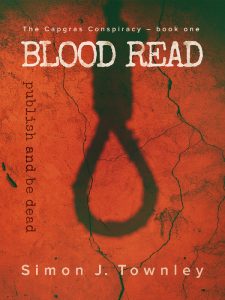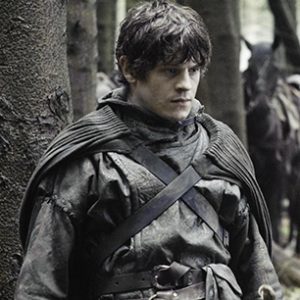My crime thriller ‘Blood Read (Publish And Be Dead)’ is close to being ready for publication. The book is the first in a series following the misadventures and mishaps of investigative reporter Tom Capgras and his family.
The book will be published this summer / autumn. In the meantime here’s the short version of the blurb and the first chapter of the novel:
A serial killer stalks the London book-world

A literary mystery thriller
When investigative journalist Tom Capgras finds his literary agent hanging from an oak beam in her West End office, an immaculately tied noose around her neck, his dreams of a non-fiction book deal appear dead in the water.
Bad day for him, worse for her.
Joanne Leatherby’s death looks like suicide but Capgras suspects murder. Nonsense, say police, who dismiss him as a conspiracy crackpot.
At Joanne’s funeral Tom meets a fellow writer, the alluring, mysterious Kiera Roche who shares his suspicions. Together they investigate and uncover links to a string of untimely deaths – editors, publishers, reviewers, even book bloggers, killed for an unkind word.
Blood on the Covers, Death in the Margins
The evidence points to one man – a mid -list author of detective tales with a career on the skids. Cast adrift by agents and publishers alike, his dreams thwarted, Arthur Middleton has gone over to the dark side and embraced self-publishing. What Kiera says may be true – that “ambition makes monsters of us all” – but how mad would a man have to be to kill for publicity, for book sales? Mad enough to admit everything on the pages of his latest blockbuster?
As the body count mounts, and the police still refuse to take him seriously, Capgras must act alone, defy the odds and get to the truth fast – before the killer gets to him.
A crime thriller with a twist of satire – in the vein of Le Carré and Leonard, with a nod to Kurt Vonnegut, Jasper Fforde and Tom Robbins. The first book in the genre crossover series The Capgras Conspiracy.
Blood Read (Publish and Be Dead)
Chapter One: The Gatekeeper
Doors never opened easily for Tom Capgras. The gatekeepers, those at the helm of life, know a trouble maker when they see one and at every turn they blocked his way.
Yet here stood an unlocked door, an inch ajar. He tapped lightly. “Jo? It’s Tom.” No answer came, only a rasping creak – an echo of summer days at the dockside, water lapping against boats, the screech of gulls and the moan of rope on wood.
Rope. That was it.
He pushed at the handle and edged into the office where Joanne Leatherby, literary agent, waited patiently for their meeting to begin. He noticed her feet first, twisting and turning above the waste paper basket. A Series 7 Arne Jacobson chair had been kicked onto its side. The desk was clear apart from a pile of papers in the centre. Tom recognised the tattered edges of his own manuscript where his printer had mangled the pages. He had been meaning to replace it for longer than he could remember. Joanne had told him it looked unprofessional.
She was beyond caring now, her face white and bloodless, her eyes staring, mouth contorted in pain. Tom yelled for help, his voice muffled as if underwater or heard through thick glass. Cut her down. Check her breathing. His foot collided with the bin and it rolled across the room.
The rope had been secured to a solid wooden desk and thrown over an oak beam. The knot wouldn’t move. What fiend devised this? Joanne didn’t seem the type for the boy scouts. Finally, it unravelled. Her body hit the carpet with a thud and he winced at the impact, though she could feel no hurt, not any more.
[continue reading…]









